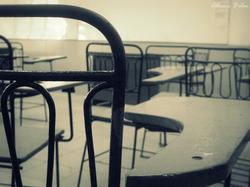|
Here we are, already week five. The marking period is winding down and I'm working to make sure I'm prepared for what needs to be done. Most of my attention is toward finishing The Trial, my independent reading book. I'm more than sure that this weekend is enough time to accomplish that, as the book is a total page turner and the rising action is coming to a head. The next book I intend on reading is Pride and Prejudice by Jane Austen. Quite a switch, I know, but love Jane Austen. A sort of guilty pleasure I suppose.
Other than the housekeeping we're doing leading up to the marking period end, we have continued to work on our What Is Literature projects. The elements I chose are Structure and Point of View. I wanted to step away from the focus on theme and symbolism that my group took on our summer reading essay. The piece I'm analyzing for structure is The Story of an Hour by Kate Chopin. I anticipate a twist ending and I'm struggling not to spoil it for myself. The work for point of view is The Boarding House by James Joyce. I need two, but I've yet to decide which I'd like. I just know I enjoy James Joyce's style so it should be fairly easy to pick apart. I just know that I'm in for unhappy endings, but nothing I'm not accustomed to thanks to my typically picking solemn literature. On the other hand, our weekly poem was anything but solemn. Bright Star by John Keats is probably one of the most loving poems I've ever read. In it, Keats wishes to be as steadfast as the star he is speaking to. He thinks of how a star gazes upon the earth without ever changing and wishes the same for himself when he's with his fair love. I loved this poem for how Keats describes his situation and uses a connection you wouldn't automatically think of to demonstrate his love. The theme for this week is wrapping up.
1 Comment
This week, our poem was the focal point to me. We analyzed I Felt a Funeral, In my Brain by Emily Dickinson. Our focus was on how Dickinson expresses intense emotion through her diction and imagery. As a class, we agreed on the theme of a depressive downward spiral. However, we often found our own spin on this idea when we considered what might have triggered Dickinson's feeling and her point of view on them. I actually enjoyed this poem in spite of the subject matter. Dickinson is able to express a vivid image without the use of many adjectives.
Aside from the weekly poem, we prepared for our project on what literature is. We discussed the 'so what?' question. Why are the literary devices important and why do we discuss them? We will be making a presentation centered on two elements of literature that we choose and read from the pieces paired with them. I'm interested to see what the other groups say about their elements and which excerpts they choose. As a special treat, we saw what a real publishing company looks for when it asked for peer review. The questions you are expected to consider are very similar to the ones we use when reviewing each other's essays. The biggest similarity though, is that you are asked not to consider grammatical errors and spelling, but content alone. The theme for this week was getting serious. This week we finished up our Summer Reading Essays and peer edited with a group that read a different pair of books. We gave and received constructive criticism and were able to fix what needed improvement, such as mentioning the page numbers for the themes we used from How To Read Like A Professor. Earlier in the week, we took a look at a sample essay from the AP Lit test. The topic was the poem XIV by Derek Walcott. The question asks you to analyse the story told by the poem and what makes it effective. We learned how to do so concisely while still touching all of the bases. The method we use is TPCASTT, a guide to poem analysis. We start just by judging what the title might foreshadow for the piece, then break down the poem and gradually pull out what we think may be the meaning of the piece. I believe this week's theme was working together.
We also had a peek into the project we will be starting soon. The name of the project is What Is LIterature? and I think that captures the idea very well. We have plenty of pieces to pick from that we can analyse and I am very excited.  This week got the class into our first true project, our group comparative essay. We were tasked with connecting points made about symbolism and theme in How To Read Literature Like A Professor by Thomas C. Foster, to the two books we chose to read over the summer. The pair I had chosen was The Book Thief by Markus Zusak and Obasan by Julie Kagawa. The group I'm working with consists of Melissa Jensen, Ian Recker, and me. A rather strong team if I do say so myself. We have already begun writing rough body paragraphs consisting of the individual ideas we have on the topics we have chosen. Once we are finished with our thoughts, we will mold them together into a final three body paragraphs. Hopefully this method allows us all to be represented and feel satisfied with the end product. Along with the essay, we have been analysing a poem in class each day. The poem is The Eagle by Alfred, Lord Tennyson. Although a short poem (six lines separated into two stanzas), we have dug out a wealth of ideas on imagery, diction, and overall meaning. At this point, I could recite the poem by heart. I'm not complaining, though. It has enhanced the confidence of the class to speak up about our often differing, but always valuable opinion on the piece. Other important details to cover include the introduction of an observing college student, Josephine, to the class atmosphere. I quite like her presence and she seems very nice. The Trial is an incredibly interesting book and I'm glad I chose it for this marking period. The overall theme of this week is new ideas. This week being the first week of school, the main idea was getting comfortable and setting up an idea of what this year will bring. A few tasks were completed to get us started. We created these portfolios to record our work and progress. Independent reading books were chosen, my choice being The Trial by Franz Kafka. We established a poem will be read everyday before class begins to get us comfortable with poetry. Overall a productive week as far as an introduction goes. I feel comfortable in this class already. This blog entry sadly will be rather scant as we are only dipping our toes into the ocean we'll be exploring in this year together. Nevertheless, this week was interesting and very important to getting the class acclimated to the atmosphere of an advanced literature class. I believe we all have a sense of what is expected of us in this class and I hope that we will all be successful in achieving this expectation.
|
AP Literature BlogA documentation of the literary adventures of our AP Lit and Comp class. Archives
March 2017
Categories |




 RSS Feed
RSS Feed
